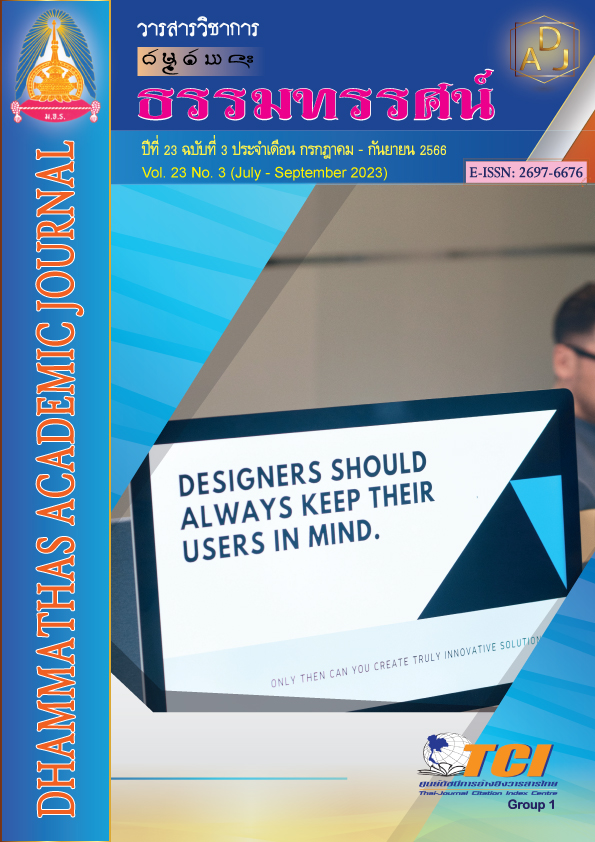Pedagogical Content Knowledge of Intern Students using Lesson Study and Open Approach
Main Article Content
Abstract
The purpose of this research was to analyze the pedagogical content knowledge of intern students who use lesson study and open approach. The target group was 3 intern students who were teaching practice in mathematics subjects for 7th-grade students on the topic of equations. The research instruments consist of 5 lesson plans on equations, field notes, a camcorder, an audio recorder, and a photo camera. The data were analyzed by analytic description.
The research results were as follows: Intern students have pedagogical content knowledge including of (1) Content knowledge, they plan to create problem situations that are consistent with content and teaching materials, plan to use teaching materials for representing the real world to link to the mathematical world, predict students' ideas in problem solving, plan to identify the discussion points and the awareness of ideas as well as misunderstandings, (2) Pedagogical knowledge, they pose the problem situations by using teaching materials to represent the real world, observe student ideas used in solving problems, order of students' ideas for presentation, discuss the important ideas, connect the representation of the real world to the mathematical world, and select of teaching materials and representations, (3) Identify student difficulty, they found the student problem of equation and several ideas for solving problem, some students are still unable to connect mathematical language to mathematical symbols.
Article Details

This work is licensed under a Creative Commons Attribution-NonCommercial-NoDerivatives 4.0 International License.
เพื่อให้เป็นไปตามกฎหมายลิขสิทธิ์ ผู้นิพนธ์ทุกท่านต้องลงลายมือชื่อในแบบฟอร์มใบมอบลิขสิทธิ์บทความ ให้แก่วารสารฯ พร้อมกับบทความต้นฉบับที่ได้แก้ไขครั้งสุดท้าย นอกจากนี้ ผู้นิพนธ์ทุกท่านต้องยืนยันว่าบทความ ต้นฉบับที่ส่งมาตีพิมพ์นั้น ได้ส่งมาตีพิมพ์เฉพาะในวารสาร วิชาการธรรม ทรรศน์ เพียงแห่งเดียวเท่านั้น หากมีการใช้ ภาพหรือตารางของผู้นิพนธ์อื่นที่ปรากฏในสิ่งตีพิมพ์อื่นมาแล้ว ผู้นิพนธ์ต้องขออนุญาตเจ้าของลิขสิทธิ์ก่อน พร้อมทั้ง แสดงหนังสือที่ได้รับการยินยอมต่อบรรณาธิการ ก่อนที่บทความจะได้รับการตีพิมพ์References
ไมตรีอินทร์ประสิทธิ์. (2546). การปฏิรูปกระบวนการเรียนรู้วิชาคณิตศาสตร์ในโรงเรียนโดยเน้นกระบวนการทางคณิตศาสตร์. ขอนแก่น: ขอนแก่นการพิมพ์.
_______. (2547). การสอนโดยใช้วิธีการแบบเปิดในชั้นเรียนคณิตศาสตร์ของประเทศญี่ปุ่น. KKU วารสารคณิตศาสตรศึกษา, 1(1), 18-20.
_______. (2557). กระบวนการแก้ปัญหาในคณิตศาสตร์ระดับโรงเรียน. ขอนแก่น: ศูนย์วิจัยคณิตศาสตรศึกษา คณะศึกษาศาสตร์ มหาวิทยาลัยขอนแก่น.
_______. (2560). การบรรยายพิเศษ ในหัวข้อเรื่อง การทำความเข้าใจคณิตศาสตร์ระดับโรงเรียนโดยวิเคราะห์หนังสือเรียนคณิตศาสตร์. ขอนแก่น: คณะศึกษาศาสตร์ มหาวิทยาลัยขอนแก่น.
_______. (2561). เอกสารประกอบการอบรมเชิงปฏิบัติการการนำแนวคิดการศึกษาชั้นเรียนและวิธีการแบบเปิดเข้าสู่ภาคปฏิบัติ. ขอนแก่น: ศูนย์วิจัยคณิตศาสตรศึกษา คณะศึกษาศาสตร์ มหาวิทยาลัยขอนแก่น.
รุ่ง แก้วแดง. (2543). ปฏิวัติการศึกษาไทย. (พิมพ์ครั้งที่ 9). กรุงเทพฯ: มติชน.
วิจารณ์ พานิช. (2556). การสร้างการเรียนรู้สู่ศตวรรษที่ 21. กรุงเทพฯ: เจริญการพิมพ์.
_______. (2562). วิจัยชั้นเรียน เปลี่ยนครู. กรุงเทพฯ: มูลนิธิสยามกัมมาจล.
สัมพันธ์ ถิ่นเวียงทอง และไมตรี อินทร์ประสิทธิ์. (2561). รูปแบบการสอนแนวใหม่สำหรับการวัดในรายวิชาคณิตศาสตร์ในระดับโรงเรียน. วารสารมหาวิทยาลัยนครพนม, 8(3), 118-127.
Abel, K. S. & Roth, M. (1992). Constraints to Teaching Elementary Science: A Case Study of a Science Enthusiast Student Teacher. Science Education, 76(6), 581-595.
Anggraena, Y. A. & Rusman, R. (2019). The Development of Mathematics Curriculum to Increase the Higher order Thinking Skills in The Sustainable Development Goals (SDGs) Era. In The 1st Workshop on Multimedia Education, Learning, Assessment and its Implementation in Game and Gamification in conjunction with COMDEV 2018, (pp.1-10). Indonesia: Womela-GG.
Ball, D. L., Thames, M. H. and Phelps, G. C. (2008). Content Knowledge for Teaching: What Makes It Special?. Journal of Teacher Education, 59(5), 389-407.
Bishara, S. (2015). Active and traditional teaching of mathematics in specialeducation. Creative Education, 6, 2313-2324.
Fennema, E. & Franke, M. (1992). Handbook of Research on Mathematics Teaching and Learning: Teachers’ General Knowledge of Teaching and Decision-Making (1). United States of America: n.p.
Inprasitha, M. (1997). Problem Solving: A Basis to Reform Mathematics Instruction. The Journal of the National Research Council of Thailand, 29(2), 221-259.
Inprasitha, M. (2010). One Feature of Adaptive Lesson Study in Thailand: Designinga Learning Unit. Journal of Science and Mathematics Education in Southeast Asia 2011, 34(1), 47-66.
Lewis, C. (2002). Lesson Study: A Handbook of Teacher-Led Instructional Change. PA: Research for Better Schools.
Murray, F. B. (1998). Reforming teacher education: Issues and the join effort ofeducation and liberal arts faculty. The History Teacher, 31(4), 503-519.
Isoda, M., et al. (2007). Japanese Lesson Study in MATHEMATICS Its Impact, Diversity and Potential for Educational Improvement. Singapore: World Scientific Publishing.
Nohda, N. (2000). A Study of “Open-Approach” Method in School Mathematics Teaching. In Paper presented at the 10th ICME, (pp. 205-210). Japan: Classroom Experiences.
Shulman, L. (1986). Those who understand: Knowledge growth in teaching. Educational Researcher, 15, 4-14.
_______. (1987). Knowledge and teaching: Foundations of the new reform. Harvard Educational Review, 57(1), 1-22.
Takahashi, A. (2015). Lesson Study: An Essential Process for Improving Mathematics Teaching and Learning. In M. Inprasitha, M. Isoda, P. Wang-Iverson, & B. H. Yeap (Eds.). Lesson Study: Challenges in Mathematics Education, (pp. 51-58). Singapore: World Scientific.
Yeap, H. B., Foo, P. & Suan, S. P. (2015). Enhancing mathematics teachers ' professional development through lesson study: A case study in Singapore. In M. Inprasitha, M. Isoda, P. Wang-Iverson & Y. Ban-Har (Eds.). Lesson Study: Challenges in Mathematics Education, (pp. 153-168). Singapore: World Scientific.

